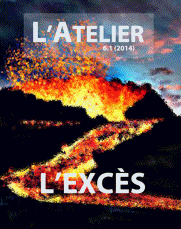Excess represented: the aesthetics of the "paradoxical party" on the British contemporary stage
Keywords:
Théâtre, Fête, Paradoxe, Beckett, Samuel, Storey, David, Pinter, Harold, Churchill, Caryl, Kelly, DennisAbstract
Representing excess is a paradoxical enterprise, which can potentially initiate new aesthetic dynamics. Such project is exemplified by the thematic interest for parties and their representation on the British contemporary stage. Celebrations and drama have always been closely associated (in Antiquity, as well as in “Shakespeare's festive world”, to paraphrase François Laroque). On the one hand, contemporary plays have maintained features of this once commonly shared moments of exuberance. British playwrights, ranging from Samuel Beckett to David Storey, do show the human body in action, expose its fluids, display a remarkable linguistic creativity, go beyond (ex-ceeds) normalising trends and question conventions as well as boundaries, thus retaining a carnivalesque manner. Yet, one can observe a gradual drabness in those once vibrant feasts. Sociologists have commented on a dilution of those periodic Dionysiac circumstances in the everyday life of the modern homo economicus. Excess is being redefined in the advent of a new, lacklustre, sometimes worrisome grey party, closer to the solemnity comprehended in the term “celebration”. Eventually, the poetics of excess are reinvented. If parties are less and less colourful, how can they still be excessive? Where does excess, if any, lie? It seems to take a new, paradoxical form in the very process of becoming an object of representation as well as what should be excluded (suppressed?) from performance. Played against a backdrop of dullness and placed at a distance by the theatrical situation, these “paradoxical parties” result in unconventional celebrations in a renewed reception process.
Représenter l'excès est une entreprise paradoxale, propre à initier de nouvelles dynamiques esthétiques, comme l'illustre l'intérêt thématique pour la fête et sa représentation sur la scène britannique contemporaine. Depuis l'Antiquité, la fête et le théâtre ont toujours entretenu des rapports de contiguïté frappants. François Laroque le montre dans son essai sur Shakespeare et la fête en évoquant l'époque élisabéthaine. Le corpus contemporain a certes conservé des traits de ces moments d'exubérance collective, et les dramaturges britanniques, de Samuel Beckett à David Storey, montrent bien le corps en mouvement, ses fluides, dans une remarquable créativité linguistique. Dans une esthétique qui demeure parfois carnavalesque, ils vont au-delà (ex-cèdent) des conventions normalisantes et de la bienséance. Et pourtant, ces fêtes autrefois explosives apparaissent de plus en plus monotones. Nombreux sociologues ont commenté cette dilution de l'effervescence dionysiaque dans la vie quotidienne de l'homo economicus moderne. L'excès se voit alors redéfini dans l'avènement d'une fête devenue terne, parfois inquiétante, une fête “grise” plus proche de la solennité d'une “célébration”. Finalement, la poétique de l'excès est réinventée. Si les fêtes sont de moins en moins hautes en couleur, comment peuvent-elles rester excessives? Si excès il y a, où réside-t-il? Il semble prendre une forme nouvelle, que nous qualifierons de “paradoxale”, et fait l'objet de la représentation tout autant que ce qui devrait en être exclu (refoulé?). Jouées sur fond de monotonie et placées à distance du fait de la situation théâtrale, ces “fêtes paradoxales” se transforment en célébrations originales qui renouvellent le processus de réception.
Published
Issue
Section
License
- Work submitted for publication must be original, previously unpublished, and not under consideration for publication elsewhere. If previously published figures, tables, or parts of text are to be included, the copyright-holder's permission must have been obtained prior to submission.
- Authors of accepted manuscripts will assign to L'Atelier the right to electronically distribute their article, or publish it in any form (Internet, CD ROM, printed copy) but authors will retain copyright and, after the article has appeared in L'Atelier, authors may republish their text (in print and/or electronic form) as long as they clearly acknowledge L'Atelier as the original publisher.


